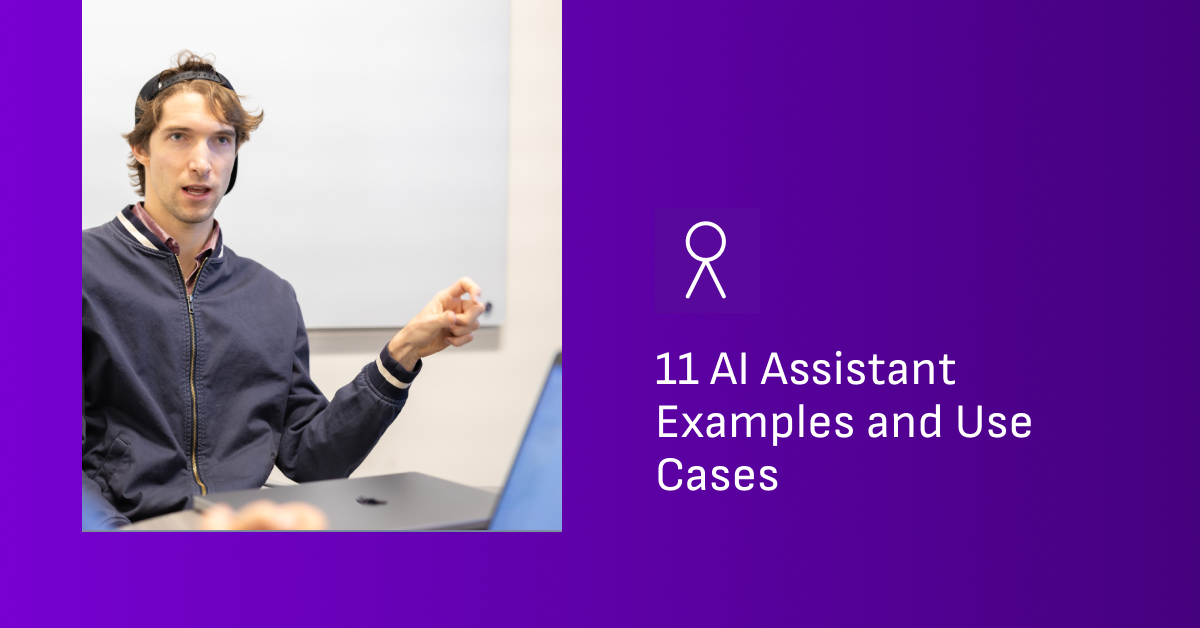“Hey IT, my laptop won’t connect to VPN.”
“HR, when’s open enrollment for benefits?”
"Where’s the latest sales deck?"
Sound familiar? You and your team probably waste hours every week tracking down answers, filing support tickets, and waiting for responses.
What if you could get instant answers, resolve IT and HR issues, and automate routine workflows — without the back-and-forth?
That’s exactly what AI assistants do. These AI-powered tools understand natural language, automate tasks, and provide intelligent support, helping you clear bottlenecks and keep work moving.
In fact, companies using AI-driven automation see a 22.6% productivity boost, especially in IT and HR.
And AI assistants are not just for setting reminders or answering FAQs. Today’s advanced agentic AI assistants possess greater autonomy and flexibility, understanding user intent and context more deeply to proactively manage tasks, adapt to new information, and learn from interactions. They handle real-work — resolving IT tickets, onboarding new hires, surfacing company knowledge, and automating approvals.
The best part? They can continue learning and improving, getting smarter over time so they can help your business even more.
Let’s look at 11 AI assistants that leading companies are leveraging for productivity gains — plus some use cases to help you see what this technology could do for your operations.
At a glance: The best AI assistants for enterprise
Company Name | Use Case | Price Range | Category |
Moveworks AI Assistant | Enterprise-wide employee support automation | Custom quotes | Enterprise Support Automation |
Aisera | Customer and employee service automation | Custom quotes | AI Service Experience Platform |
Microsoft Copilot | Productivity enhancement within Microsoft ecosystem | Starts at $20/user/month | Workplace Productivity AI |
ServiceNow Now Assist | AI-driven IT service management support | Custom quotes | ITSM and Service Automation |
Kore.ai | Conversational AI for customer and employee support | Custom quotes | Conversational AI Platform |
Glean | Enterprise knowledge discovery and search | Custom quotes | Enterprise Search |
Amazon Q Business | Workflow automation and enterprise search with AI | Starts at $20/user/month | AI-Powered Enterprise Search |
IBM watsonx | Enterprise operations and governance | Custom quotes | Enterprise AI and Compliance |
Zapier Agents | Cross-application workflow automation | Starts at $0/month | Workflow Automation |
Zendesk AI | Customer support automation | Starts at $55/agent/month | AI-Driven Customer Service |
Salesforce Agentforce | AI-powered CRM customer service automation | Custom quotes | AI-Powered CRM Service Automation |
The role of AI assistants at work
Before we start exploring the tools, let’s cover exactly how AI assistants can be used in professional settings.
Enterprise AI assistants are built to handle complex tasks — whether it’s answering IT requests, retrieving company knowledge, or streamlining HR approvals — so your team can focus on work that matters.
Unlike personal assistants like Alexa or Google Assistant, enterprise AI tools go further. Instead of simple voice commands, they integrate directly into your workplace tools, using conversational AI to provide instant answers in Slack, Microsoft Teams, and other business platforms.
They can also tackle tasks like resetting passwords, scheduling meetings, updating HR records, and pulling reports.
Instead of waiting on support teams, employees can get real-time help, just like messaging a coworker.
As your company grows, these AI assistants simplify how teams interact with complicated systems by acting as a central, user-friendly hub for IT, HR, and operations.
The best part? Advanced AI assistants continuously learn, getting smarter over time and making support even faster and more accurate over time.
Want to see how transformative agentic AI can be for your workplace? Join us for a webinar on how agentic AI is transforming the workforce in 2025.
The best use cases for AI assistants in the workplace
So, what tasks can an AI assistant take off your team’s plate?
AI assistants are highly valuable when it comes to handling high-volume, repetitive tasks that benefit from automation — while still delivering a seamless, personalized experience, like:
Employee onboarding
Bringing on new hires is time-consuming, especially when HR teams juggle multiple requests at once.
AI assistants streamline onboarding by reducing the administrative burden of processing new hires, helping them get up to speed faster.
By integrating with HR systems, advanced AI assistants can automate paperwork, answer common questions, and ensure employees have access to the right tools from day one.
This automation delivers significant benefits across the organization:
- New employees get immediate answers to common HR questions like pay dates or holiday calendars — no more waiting for someone to reply
- HR teams can focus on people, not paperwork — freeing up time for meaningful connections instead of getting stuck in admin work
More advanced AI can:
- Paperwork is handled automatically — documents are sent, collected, and verified with little to no human assistance
- Employees get the right tools from day one — System access and resources are set up based on their role and department
- Training is organized for employees — and reminders are sent out at the right times
Digital transformation
For IT teams, an AI assistant serves as the first line of support — handling tech-related questions, troubleshooting issues, and keeping everything running smoothly.
Instead of juggling multiple support channels, employees get fast, standardized solutions — no matter how they ask for help.
This centralized approach is especially helpful during big tech transitions, offering great benefits for IT teams, like:
- Resolving common issues instantly with little to no human intervention
- Capturing knowledge from support interactions to make future resolutions faster and smarter
More advanced AI can:
- Proactively monitoring systems and alerting teams to potential issues
- Seamlessly deploying software updates, reducing downtime
- Automatically sorting and routing support tickets to the right specialists
These capabilities not only reduce IT workload but also strengthen security by helping enforce policies, detecting vulnerabilities early, and ensuring rapid response to potential vulnerabilities — before they disrupt your business.
Employee self-service
Employees expect the same convenience at work that they experience as consumers: immediate service on their own terms.
This is especially true in the remote/hybrid work era.
Yet, in many workplaces, employees still waste time chasing down answers. AI assistants change that by offering instant, self-service access to the information and tools they need.
An effective AI assistant lets employees:
- Find answers fast by navigating the company knowledge base
- Update personal information like addresses, emergency contacts, and name changes
- Request and receive software access based on role and policies
- Instantly access company policies and procedures — no digging required
More sophisticated AI can also:
- Reset passwords and manage multi-factor authentication without IT help
- Book meeting rooms and resources in seconds
This self-service feature makes it a lot easier for employees by cutting out wait times and unnecessary back and forth.
They can get what they need, when they need it, without having to rely on the service desk or worry about business hours.
Operational efficiency
Beyond specific departmental use cases, AI assistants help businesses run smoothly by automating routine tasks and making communication more efficient across teams.
These systems can:
- Generate reports and extract insights from business data
Agentic systems like Moveworks can:
- Automate approval workflows for purchases, time off, and resource allocation
- Create and distribute meeting agendas, notes, and action items
- Track progress on projects and send reminders for approaching deadlines
- Schedule meetings by finding optimal times across multiple participants' calendars
Individually, these tasks may seem simple, but together they consume hours of valuable time. By taking care of routine tasks, AI assistants let employees focus on work that needs human creativity and strategic thinking.
How to choose an AI assistant for your business
Selecting the right AI assistant for your business isn't just about picking the most advanced technology — it’s about finding a solution that aligns with your specific business needs, workflows, and long-term goals.
Here’s a simple decision framework to help guide your choice:
1. Identify your primary automation needs
AI assistants excel in different areas, so start by pinpointing your biggest operational challenges:
- Do you need to improve IT support response times?
- Are you looking to streamline HR service delivery?
- Is knowledge discovery and management a key focus?
- Do you need an AI assistant that integrates across multiple business systems?
Clearly defining your priorities will help narrow the field and ensure you choose a solution that delivers measurable value.
2. Evaluate the user experience
The most powerful AI assistant won’t add value if employees don’t use it.
- Look for intuitive, conversational interfaces that employees can easily interact with via chat, voice, or enterprise applications.
- Assess adoption speed—AI assistants should require minimal training to be effective.
- Test real-world usability by requesting a demo or pilot program before committing.
Moveworks, for example, is built to understand natural language, allowing employees to make requests in everyday terms — no IT expertise required.
3. Consider your integration requirements
Your AI assistant should seamlessly connect with the tools your teams already rely on.
- Does it integrate with your ITSM, HRIS, CRM, and collaboration tools?
- Can it connect with enterprise databases and knowledge bases?
- Does it offer pre-built connectors or API capabilities to future-proof your investment?
Moveworks integrates with ServiceNow, Workday, Microsoft 365, Google Workspace, and other major enterprise platforms, ensuring effortless deployment without disrupting existing workflows.
4. Look beyond the marketing hype
AI capabilities can vary significantly between solutions.
- Can the assistant handle multi-step processes and complex workflows?
- Is it truly autonomous, or does it rely heavily on human intervention?
- Does it provide accurate responses in real-world business scenarios?
Ask for a detailed demo with use cases specific to your organization — not just a generic product walkthrough.
5. Don't overlook security and compliance
AI assistants handle sensitive company data, so security should be a top priority.
- Does the assistant enforce role-based access controls?
- Can it maintain compliance with industry regulations like GDPR, HIPAA, or SOC 2?
- Does it provide audit logs and visibility into AI-driven decisions?
Moveworks is designed with enterprise-grade security, ensuring that only authorized users access sensitive IT and HR information.
6. Plan for long-term adaptability
Your AI assistant should scale with your business, adapting to new workflows and emerging AI advancements.
- Can the AI continuously learn and improve?
- Does it allow customization to match your company’s evolving needs?
- Will it work with future software upgrades without major disruptions?
Moveworks’ AI architecture is built to evolve, ensuring that as your business grows, your AI assistant remains just as effective.
7. Calculate the total cost of ownership (TCO)
Beyond the licensing cost, factor in:
- Implementation and setup costs: Is it plug-and-play, or does it require extensive IT resources?
- Ongoing maintenance: Will you need AI specialists to keep it running smoothly?
- Expected ROI: How much time and cost savings will it generate over time?
Moveworks is able to deliver value in weeks, not months, thanks to low-code implementation and automated agentic capabilities.
Choosing an AI assistant isn’t about chasing the latest trend — it’s about finding a solution that integrates seamlessly into your workflows, enhances productivity, and scales with your business.
AI assistants for IT, HR, and employee support
When it comes to enterprise support functions, the right AI assistant can eliminate bottlenecks and deliver instant support by combining conversational ease with automation capabilities.
These specialized assistants help IT and HR teams scale their support while improving the overall employee experience.
Learn how to unlock productivity and empower your workforce with Enterprise Search.
Moveworks AI Assistant
Moveworks offers an enterprise-grade AI assistant that automates tasks across different departments. It provides a single platform that is able to handle everything from IT helpdesk tickets to HR requests.
Moveworks delivers full-service automation, allowing employees to get instant answers, resolve issues, and keep work moving — without having to wait on support teams.
Moveworks AI Assistant delivers full-service automation, allowing employees to get instant answers, resolve issues, and keep work moving — without waiting on support teams.
Key features:
- Understands natural language in multiple languages, so employees get instant support wherever they work
- Resolves issues autonomously, reducing the need for human intervention
- Integrates seamlessly across your hundreds of enterprise applications and systems so teams don’t have to switch platforms
- Deploys quickly to delivering value in a little as a weeks, rather than months
- Empowers teams to build custom AI agents —no machine learning expertise required
What sets Moveworks apart is its Reasoning Engine, which goes beyond basic automation. It is able to understand the context of requests, determine the course of action, and execute complex workflows — reducing manual back-and-forth.
This agentic approach allows Moveworks Assistant to solve problems end-to-end rather than just handling simple FAQs.
Ideal for large enterprises with diverse support needs, Moveworks is able to dramatically reduce resolution times from days to minutes while providing a consistent experience across channels including email, chat, and mobile.
See for yourself how Moveworks can transform your enterprise support.
Aisera: Enhance customer and employee service with AI-driven solutions
Aisera offers an AI-powered platform that makes life easier by automating support for both customers and employees. Using conversational AI, it combines natural language understanding with process automation to deliver a complete end-to-end solution.
Key features:
- Conversational AI that can understand tough service requests
- Autonomous resolution of common support issues
- Pre-built integrations with other popular applications
- Industry-specific solutions for different verticals
- Self-learning capabilities that improve over time
Aisera's platform is for organizations looking to automate service desk operations across multiple departments — delivering a unified employee experience while reducing the need for multiple specialized tools.
Microsoft: Strengthen employee productivity with AI-powered automation
Microsoft Copilot integrates AI assistance directly into the Microsoft 365 suite of applications, helping employees work more efficiently within their existing tools.
This deep integration with the Microsoft ecosystem makes Copilot a viable option for organizations that rely heavily on Microsoft technologies.
Key features:
- Content generation and summarization in Word, PowerPoint, and Outlook
- Data analysis and visualization in Excel
- Meeting transcription and action item tracking in Teams
- Contextual search across organizational content
ServiceNow: Enhance support with generative AI
ServiceNow's AI assistant, Now Assist, enhances the company's established IT service management (ITSM) platform with conversational AI capabilities.
It helps organizations make the most of their ServiceNow investment with smart automation.
Key features:
- Automated ticket categorization and routing
- Virtual agent support for common service requests
- Knowledge article recommendations
- Predictive analysis of incident patterns
- Process automation for routine IT and HR workflows
This solution works well for organizations that already use ServiceNow and want to enhance existing ITSM processes without switching to a whole new system.
Kore.ai: Optimize customer-facing and employee support with conversational AI
Kore.ai has a conversational AI platform you can use for both customer support and internal operations, coming with tools to help you build custom virtual assistants tailored to your needs.
Key features:
- Industry-specific conversation models for healthcare, finance, and retail
- Omnichannel deployment across web, mobile, and messaging platforms
- Advanced dialog management for complex conversations
- Integration with existing systems
Kore.ai is well-suited for organizations that need both customer-facing and employee support automation, particularly those in regulated industries with specific compliance requirements.
AI assistants for knowledge management
With businesses creating more data across different systems, it’s getting harder to find the information you need.
That’s where AI assistants for knowledge management come in: They make it easier to access and put your organization’s information to use.
Moveworks Knowledge Studio enables you to easily create, organize, and update knowledge articles based on your enterprise data – and uses permissions to surface the right information to the right people at the right time.
Instead of employees struggling to find information, Moveworks is able to automate the generation and management of documentation, enabling your answers to be accurate, up-to-date, and easy to access.
By reducing knowledge bottlenecks, Moveworks ensures employees can self-serve answers instantly, helping to reduce IT and HR workload while improving overall workplace productivity.
Request a demo to see how AI-generated knowledge can supercharge your self-service support.
Glean: Centralize and unlock organizational knowledge with AI
Glean offers an AI-powered search assistant that brings all your organization’s information together, making it easy to access across different systems, apps, and repositories.
Key features:
- Unified search across documents, emails, chat, and applications
- Personalized results based on role and access permissions
- Understanding of company-specific terminology and concepts
- Document summarization and key point extraction
- Integration with 100+ enterprise applications
Glean is designed for knowledge-heavy organizations looking for one simple interface for all organizational knowledge to reduce information silos.
AI assistants for business operations and integration
For enterprises looking to streamline operations across multiple systems, integration-focused AI assistants provide powerful automation capabilities that connect different applications and data sources.
Amazon Q Business: Automate and enhance business workflows with AI-driven insights
Amazon Q Business is an AI-powered assistant from AWS designed to enhance workplace productivity by enabling employees to access information, automate workflows, and complete tasks using natural language.
Key features:
- Natural language understanding for contextual business questions
- Direct integration with AWS services and enterprise applications
- Secure access to company data with appropriate permissions
- Custom knowledge bases for organization-specific information
- Multi-channel availability across web, chat, and mobile interfaces
Amazon Q Business is an option for organizations that want to use AWS infrastructure for generative AI while keeping enterprise-level security and governance in place.
IBM watsonx: Leverage AI for scalable and robust business operations
IBM watsonx provides businesses with access to powerful generative AI models for tasks like content creation, summarization, and automation. With built-in governance and security, watsonx.ai ensures AI deployments remain transparent, compliant, and optimized for enterprise needs.
Key features:
- Advanced natural language processing (NLP) and understanding
- Emphasis on making AI decisions clear and easy to understand
- Governance controls for regulated industries
- Integration with enterprise data sources and applications
- Customizable assistants for specific business domains
IBM watsonx is designed for large enterprises in regulated industries like healthcare, financial services, and government that need to balance AI innovation with strict compliance requirements.
Get your copy of the Gartner® Magic Quadrant™: AI Applications in IT Service Management report.
AI assistants for workflow task automation
Workflow automation assistants help organizations connect disparate systems and automate processes that span multiple applications without extensive custom development.
Zapier Agents: Automate complex workflows with seamless integration
Zapier Agents bring conversational AI to Zapier's integration platform, making it easy to create and manage automations using simple, everyday language commands.
Key features:
- Integration with 5,000+ applications without coding
- AI-powered workflow suggestions based on usage patterns
- Natural language interface for creating automations
- Error detection and troubleshooting recommendations
- Workflow templates for common business processes
Zapier is good for small to mid-sized businesses looking to automate processes across multiple cloud apps without a dedicated developer. With its huge library of pre-built integrations, it’s easy to set up and works well for teams using standard SaaS tools. Enterprises can also consider Moveworks AI Agent Builder as a strong alternative.
AI assistants for customer support
Although we're mainly focusing on internal enterprise use cases, AI assistants designed for customer support often bring useful features that can be adapted to help employees, too.
Zendesk AI: Elevate customer support with intelligent automation
Zendesk AI enhances the company's customer service platform with intelligent automation features that are designed to improve support efficiency and customer satisfaction.
Key features include:
- Automatic ticket triage and routing
- Answering recommendations for support agents
- Sentiment analysis of customer interactions
- Automated responses for common inquiries
- Continuous learning from support interactions
While primarily designed for customer-facing support, Zendesk AI could be adapted for internal service desks, making it an option for organizations looking to enhance both customer and employee support with a single platform.
Salesforce Agentforce: Transform customer interactions with AI-powered service agents
Salesforce Agentforce uses the power of Salesforce's Einstein AI to create smart service agents that can tackle complex customer interactions across multiple channels.
With its integration into Salesforce data and workflows, it helps deliver personalized customer experiences while lightening the load for agents with smart automation.
Key features:
- AI-powered case classification and routing
- Automated responses to common customer inquiries
- Agent assistance with recommended solutions and next steps
- Omnichannel support across web, mobile, and messaging platforms
Agentforce is an AI tool for companies already using Salesforce CRM and looking to add AI to their customer service.
Supercharge workforce productivity with Moveworks AI Assistant
Enterprise AI assistants are transforming the workplace — boosting efficiency, improving service, and creating better experiences for employees. But not all AI solutions are built the same.
Moveworks AI Assistant stands out here, offering a complete solution that tackles all kinds of enterprise support needs. With its advanced AI architecture, it can handle complex requests, navigate multiple systems, and solve issues on its own — delivering high-quality automation that goes far beyond that of basic AI chatbots.
With Moveworks, your employees are able to spend less time on admin tasks and more time on work that drives innovation. Support teams can focus on strategic initiatives instead of troubleshooting routine issues.
Request a demo today to see Moveworks in action and discover how an intelligent AI assistant can supercharge productivity across your company.
Table of contents



